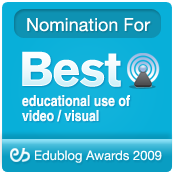 In the past six days I’ve received six emails from various companies asking me if I’d please be so kind as to promote their services, talk about their products or otherwise just mention their wares in a blog post. This is not a new thing – I’ve been getting more and more of these requests over the past 12 months – but the frequency of them has been increasing to the point where it now sometimes averages one a day. In a weird sort of way, I guess this is an indication of some level of “success” in the blogosphere.
In the past six days I’ve received six emails from various companies asking me if I’d please be so kind as to promote their services, talk about their products or otherwise just mention their wares in a blog post. This is not a new thing – I’ve been getting more and more of these requests over the past 12 months – but the frequency of them has been increasing to the point where it now sometimes averages one a day. In a weird sort of way, I guess this is an indication of some level of “success” in the blogosphere.
But to anyone considering asking me to be a schill for your wares, can I save you all some time? The answer is no. This is a blog, not a brothel.
Look, I’m sure your products and services are fabulous, and I have no doubt that someone, somewhere may be interested in them. I even kind of admire the fact that you “get” the power of new/social media enough to take the initiative of asking regular people like me to spruik the benefits of your products. It’s nice that some of you couched it in terms of “take a look at what we do and if you think it’s a good thing, perhaps you can tell people about it”… that’s at least a respectful way of asking for promotional assistance. But the answer is still no. If I thought that a blogger was writing about something for any reasons other than their own, I would lose all faith in whatever they had to say, never being sure exactly where the line was between opinion and advertising. I’m used to being lied to in the traditional media, but I expect better from new media.
To that online university offering a 3 year degree program… it sounds like an ok idea, but no, I don’t want to include a link to your site on my site. Actually, what is it with online universities? – I have had a ton of requests from quite a few of them, all asking me to include a “simple text-based link” to them, many even offering me reasonable cash payments to do so. The answer is still no.
To that multimedia organisation that is “creating a portal into the soul of humanity by championing the selfless acts of others”… thanks for asking, but no.
To the flashcard company that wanted me to review their product on my blog, no, sorry. Actually, after looking at what your product and educational philosophy is all about, it’s probably better I don’t write a review for you. Any tool that focuses on creating better ways to do rote learning is not something you want me to review, trust me.
To the other flashcard company who also wanted me to write about their “unique free services” in one of my upcoming posts, thanks but no thanks. Again, I’m less than impressed with services that help me learn better at the lowest end of Blooms taxonomy.
To the childrens’ book online website that was keen for me to write a review of their product in exchange for a 6 month premium subscription… nope. Thanks for thinking of me, but asking me to blog about your product, and then telling me how much my readers would benefit from it is a less than subtle way of disguising how much you think you might benefit from it. Thanks, but again, no.
And to the commercial blog run by an online school that was interested in me reposting one of their recent posts, because it would “appeal to my readers”, thanks for thinking of us all, but no. If the content is compelling enough, people will find it without my help.
Like I said, I appreciate being asked (although you can all stop asking! The answer is still no!) and I suppose it’s nice to think that other people might consider this blog to be worthy or influential enough to ask for a bit of free publicity. If this happens to me, I can only imagine how many of these requests are made to other bloggers with some real influence!
The bottom line is that Betchablog is, and will remain, independent. I’m not interested in writing about anything other than what I’m interested in writing about. I don’t take money in exchange for opinion. I won’t write about anyone’s product or service unless I want to do it for my own reasons. I certainly won’t put links into my posts that I’ve been paid to put there. I’m flattered to be asked, but even thinking about doing it makes me feel dirty.
Image: ‘Soho Street‘

 I remember the first time I saw
I remember the first time I saw 
